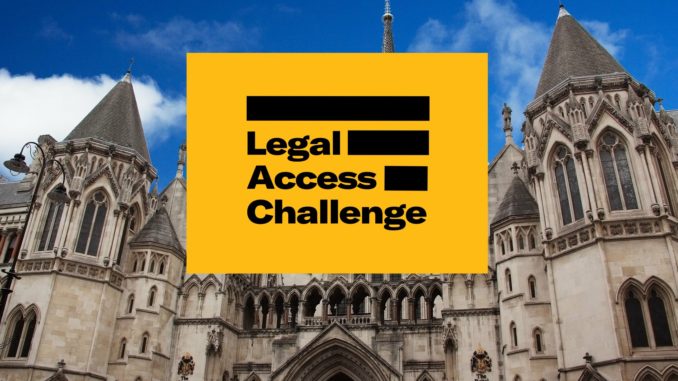
By Chris Gorst, Director of Challenges, Nesta Challenges
In these tumultuous times it is hard enough to remember what was happening 18 days ago, let alone 18 months. Yet it was a year and a half ago that the Solicitors Regulation Authority (SRA) and Nesta Challenges set out to incentivise innovators and entrepreneurs to make the legal system in England and Wales more accessible; harnessing advances in lawtech for the benefit of underserved individuals and small businesses. This led in May 2019 to us launching the Legal Access Challenge.
The Challenge included a programme of research, the establishment of a new network of innovators and a £500,000 challenge prize. It called on innovators to submit bold solutions to the “legal gap” in England and Wales where many individuals and small businesses were left with a sense that the legal system was not designed for them. Well over 100 entries were received from the UK and around the world and whittled down to eight outstanding finalists. They each received £50,000 of funding and six months of expert support to develop their solutions. We have just recently announced the two overall winners who have been awarded a further £50,000 each, taking their prize totals to £100,000.
The first winner was RCJ Advice’s CourtNav and FLOWS platform, which supports domestic abuse survivors through tools that effectively integrate technology with human advice and support. CourtNav collects evidence for a FL401 non-molestation order application and quickly links female and male survivors with an accredited domestic abuse legal aid solicitor. Meanwhile, FLOWS empowers women survivors to find clear information and local legal support as well as offering a secure and discreet webchat app. The effectiveness of CourtNav has already been recognised by HM Courts & Tribunals Service, with RCJ being asked to roll out the service immediately to help connect survivors to the courts system whilst both are in lockdown.
The second winning solution came from Mencap and Access Social Care (ASC) which developed a social care rights virtual adviser with pro-bono support from IBM. The advanced chatbot uses IBM Watson technology to provide free, accessible legal information, particularly for those who are experiencing challenges accessing social care. Its AI learns from user interactions, providing ever-more intuitive advice, allowing Mencap and ASC’s lawyers and advisers to allocate more time to the most complex cases. The goal for the future is for the virtual adviser to be hosted on the websites of other advice organisations in the social care sector.
The two winners and six finalists have all accelerated their impactful ideas during the Challenge, demonstrating the potential benefits of lawtech to a broad and varied audience. From our experience of challenge prizes in other regulated sectors, we’re confident they will all go on to make a meaningful impact in their fields of expertise. These range from online dispute resolution, understanding employment rights, tackling workplace harassment to completing financial disclosures, informing consumers of their digital rights and group litigation tools.
Though the two winners came from the not-for-profit sector, overall, the Challenge finalists demonstrate the commercial viability and opportunities in lawtech designed with individuals and SMEs in mind. These opportunities are not going unnoticed: three of the eight finalists have secured further investment funding, while two finalists have secured further grant funding to support their solution and one finalist is currently raising a further investment round.
In 2018, global investment in lawtech hit $1bn for the first time. Last year, that record had already been broken by September. It is difficult to predict what the effect of the Covid-19 pandemic will have on the market in the short-term, but in the long-term, there is little to suggest that investment in lawtech will slow. In the context of these billions, a £500,000 prize might seem small, but I would argue whereas the majority of lawtech investment has benefited the corporate end of the market, until now the consumer and SME space has missed out. I hope a wider legacy of the Legal Access Challenge will be an unabashed demonstration to potential investors that there are worthwhile opportunities across the gamut of lawtech and to would-be innovators that there is a market for products outside the corporate sphere.
Equally as important as the future success of lawtech in the UK are the lessons learnt during the challenge. These will go to further inform how the SRA works in future to support the development and adoption of technology, and other innovation so that opportunities and new ideas can flourish.
While the Challenge has confirmed that SRA’s regulation is not a hard barrier for lawtech innovators (since it is flexible and not prescriptive), there are softer barriers to innovation. The Challenge has helped the SRA to understand better what these are. They include the support innovators need to navigate poorly understood and sometimes overlapping regulatory regimes. The Challenge has also demonstrated that collaboration by regulators is vital.
The Challenge has also identified how the SRA can assist innovators that are developing online platforms to make sure they are designed in a way that solicitors can interact with while being assured that they are compliant with regulation. The whole process has underlined the importance of engaging with innovators to understand opportunities, barriers and risks in practice. This helps shape the SRA’s regulatory approach to support innovation which benefits the sector and ensures it is safe for clients.
Ultimately, the lessons from the Legal Access Challenge show that regulation that is rooted in the needs of the public and of innovators can unlock innovation. We are confident that the legacy of the prize will live on in the successes of the winners and finalists, and that their hard work and bold ideas will pave the way for future innovation to flourish and benefit the full spectrum of the legal services sector.